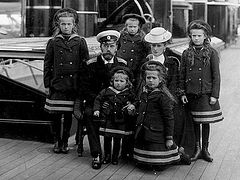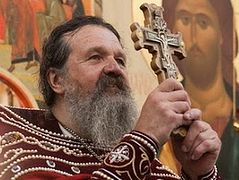On the feast of the Seven Holy Youths of Ephesus, to whom Church Tradition attributes special intercession for children, Archpriest Alexander Nikolsky, rector of the Moscow Church of the Three Holy Hierarchs in Ramenki, a father of seven daughters and three sons, the head of the Orthodox Family club, the author of the book, How to Be Happy in Marriage, published by the Sretensky Monastery’s Publishing House, spoke about the role of prayer in a child’s upbringing.
—Fr. Alexander, how can we teach a child to pray?
—Man is a free being, and he should not have faith just because he trusts his parents. There is an expression: “faith by trust.” Sooner or later everyone will have to ask himself the question: “Do you believe in God or not?” It’s not a question of upbringing. God, even with the best religious upbringing, gives everyone a choice.
A boy of seven or eight comes to me to confess his sins, and his mother tells him not to forget to tell me how he disobeys. Of course, he can repeat that he disobeys, but there is no repentance in this. He himself should be ashamed and express this shame in confession before God. And sometimes mothers give their children notes for confession, written in such a clear adult handwriting... But instead let him tell me in his own words that he disobeyed his mother, and this will be a confession. Relationship with God is a free choice for every person. But sometimes people believe that the right upbringing will do the trick. However, there are children even in good families who do not believe in God. I know a family where one son is a priest and the other is an atheist. And I know another family in which all the sons are priests. The main thing is for parents not to harm this choice, but to teach their child to pray without forcing him to ensure that he likes it and is happy. And if he shudders at the very thought of prayer, it will be difficult for him to come to believe in God. Parents should not complicate this path for their children.
—But how can we practically help a child so prayer can become a necessity for him?
—It is important not to put pressure on a child. Because if you push him, nothing good will come of it. Sometimes in religious families children receive a permanent vaccine against prayer and get so disgusted with it. And when such a child grows up, it is hard for him to enter the Church purely psychologically. My mother had a friend, a very good woman. Whenever she walked down a street and saw a church, she always crossed over to the other side. Although she was a very compassionate person! But she was brought up that way—her parents instilled dislike for the Church in her by excessive pressure. Therefore, it is better not to put pressure on children. If you have a good relationship with your child, he himself tries to imitate his father and mother. It is absolutely pointless to force a small child to pray.
When I was a newly ordained priest, we had a parishioner who on weekdays would stand for an hour and a half at the Liturgy with his five-year-old child. The child stood motionless all that time. But this is a very rare example when a child stands so still. Children are children, of course. So, it is best to sing prayers with them: “Our Father”, “Rejoice, O Virgin Theotokos...” But even if the family is integrated into Church life, the father is a priest, and there are no excesses and distortions in upbringing, the child grows up, becomes an adult, and at the age of sixteen or seventeen may lose interest in the Church and Church life. This happens even in very good church families in which children attended Sunday schools and so on. A young person, already in early adulthood (after eighteen), makes his personal choice, choosing to believe in God or not to believe.
—How should a child’s prayer rule change as he grows up?
—It is very individual. I have a family in the parish in which children of different ages attend our church. And when their mother comes up to me and complains that her son doesn’t pray enough, I tell her, “Your son at the age of sixteen stands through the Liturgy in church almost every Sunday. It’s a phenomenal success. None of his peers stands in church—the others hang out online.” You should not think about what the prayer rule should be: you need to look at the situation and at the person. Do not ask your child daily whether he has read the prayer rule: what matters is the child’s desire. If he reads “Our Father” from the heart at the age of sixteen, it’s fine. This means that he is a believer and, to a certain extent, a church-going teenager. There is the following children’s rule before Communion: the year the schoolchild is in should be the number of prayers from the rule for Communion he should read. But, I repeat, you need not stand over him and even correct the stresses: the most important thing is that he wants to pray and does not do it mechanically.
—But if he still doesn’t want to? And at the age of fourteen he only reads “Our Father” before Communion?
—That’s good. He reads, listens, and stands at the Liturgy.
—And what about the three canons prescribed before Communion?
—What if he doesn’t read the three canons? 150 years ago, when the greater part of our population was illiterate, people did not read three canons either, but some of our people became saints at that time. They used to read a certain number of Jesus Prayers instead of each canon. Again, this is a personal choice. Sometimes people misunderstand the meaning of the outward religious rites and become hypocrites. Who did the Lord admonish most in the Gospel? Ascetics who prayed hard, kept strict fasts, gave alms, etc. They had no problem with the external performance of the rites. But for some reason the Lord constantly exhorted the Pharisees, not the publicans and harlots! It was the fanatics of the external law who crucified Christ. That is, a person can read the three canons and easily crucify Christ.
A person should have a living faith. Then he can read the three canons, the Psalter, and akathists even every day. A religious feeling requires food, and the food for faith is prayer, as St. Gregory the Theologian said. The person himself will expand the prayer rule, because he will feel an urge for it. I spoke with a father who has had great success with his children in this matter. He said that you need to seize the right moment to be able to talk with your child. It is very difficult, and many fail. It is important for a child to receive a religious answer to his life problems, which happens more often in adolescence.
I know children who first read the entire rule and then abandoned it as it became unnecessary for them.
—You and your wife have children of different ages. Judging by your family’s experience, is it worth it for everyone to get together when the older children read the rule aloud and the younger ones listen?
—It varied at different times and periods of our life. As long as they are all small, it is easier to get them together. And when the youngest is five and the eldest is twenty, it is already more difficult.
I have also studied this issue. Every child needs to be treated individually. In the families which have succeeded in this matter the parents did not force the child to read the rule, but “seized the moment”. And a common family rule is not a guarantee. The Lord created the angels, and some of them became demons. God had nothing to do with that—it was their personal choice. And you can’t get away from someone’s personal choice—you have to put up with it. God works with our unbelief patiently. We must follow God’s example.
—So, if your children are disinclined to be involved in your common family rule, then you should not insist?
—If the rule is long, then naturally they don’t want to. For a small child fifteen to twenty minutes are too much. Okay, let him read “Our Father” and go.
—How would you formulate this for young parents who ask you what goal they should set when calling their children to prayer?
—The goal is to get the children themselves to want to pray a little. Let it be only “Our Father”. Clearly, you have to organize a five-year-old, but don’t force him and don’t go too far. We are often busy with our own problems and do not always have enough time, but we should be attentive to our children and listen to them. It is very hard, but those who do it can seize the right moment.
—Is it important to pray with our children, or can a child pray on his own and in his own words provided he does it sincerely?
—Undoubtedly, praying together is good. But the child can get bored and start yawning while you are praying together. What’s the point in doing it if he stops praying? Maybe the other children are involved in the process, but what if his inner protest is growing from joint prayer? When your child reaches the age of twelve or fourteen, you should give him freedom in this matter.
My wife and I had Communist parents. We heard God’s call and came to the Church when we were about eighteen or nineteen. For the first eighteen years of my life I was a non-believer—such was the education in Soviet schools. As parents, we want the best for our children. This is an understandable parental feeling, in which there are both love and pride. A child can come to believe in God, and we can create conditions that will either prevent or favor this. Any lack of freedom in this matter will hinder the path to God.
—If a child says that it is hard for him to stand in church during the service, then should we not insist and allow him to go and play on the playground?
—Of course, a child should be given a cross he can carry. You don’t force a seven-year-old to do what a seventeen-year-old does, do you? It’s the same here.
—So maybe we should not teach children to pray at all?
—Let’s not go to extremes. It is necessary to teach children to pray, but judging by the situation. The most important thing for us to remember is to give our child freedom. You have given him as much as you could as to your child. Then he himself should choose. Of course, you need to support him and help him if he asks for help. One of my sons once told me that if he had been under great pressure as a child, he would have stopped going to church long ago.
—What do you think is the most important aspect of teaching children spiritual life? Is it prayer or something else?
—The most important thing is love for your child. Don’t pamper him, don’t satisfy all his whims, but love him. Then, if he sees that everyone in the family is religious, this will contribute to his conversion to God. And vice versa: if you get angry, are easily irritated, or don’t give him enough attention and punish him without reason, he will have the opposite opinion. I had a friend, a very religious man, whose son became a satanist. I asked the young man why he had become a satanist, and he said that whenever his father came home he beat his (the boy’s) mother. He had been an absolutely normal young man, but his protest took such a form. You must love your child and spouse, and be a good Christian.
—Many parents believe that they should send their children to Orthodox schools in order to raise them to become “true Orthodox”.
—This is the greatest delusion. Unfortunately, not all children who graduate from Orthodox schools are believers. Moreover, at school a child may find himself in a situation of external pressure, which will cause protest. This is by no means a universal remedy. Nevertheless, the main thing for religious upbringing of a child is the inner spiritual life of his family.
—Fr. Alexander, it is commonly believed that a child’s prayer is more effective than that of an adult. Have you ever been convinced of this?
—A priest I know had a very difficult situation when he was building a church. One day he came home and asked his children to read the Akathist together. They read the akathist, and a miracle occurred to him. Unfortunately, I personally haven’t experienced anything like this yet. But there are such examples, and I collect them bit by bit. This all agrees with what was written in the Gospel and by the Holy Fathers.
—And how should we explain to our child that the Lord hears his prayers if he does not see a real results?
—You should “seize the right moment” and show it so he can see and believe.
—Should we try and find some special words to explain the purpose of prayer to children, or should they feel it themselves at a subtle spiritual level?
—When they have come in contact with God, they should feel that God has answered them. But this can only be achieved with God’s help. It seems to me that parents’ prayer for their children is one of the key aspects of religious upbringing.
—Do young parents often ask questions about prayer?
—Basically, they don’t ask. I organize talks at the church, and the experience of people who have succeeded in this matter is interesting. And everyone came to the conclusion that prayer without faith is not prayer.
The Holy Fathers wrote that seventy percent of success in raising children is praying for them. When I first read that, I thought they were exaggerating a little. But then many times I was convinced of the correctness of their words. Therefore, I advise parents to pray hard for their children. Talk not so much about God as to God. This attracts grace to your children and facilitates their prayer more than a purely outward compulsion. Prayer is neither auto-training, nor some psychological practice—it is a conversation with God.








